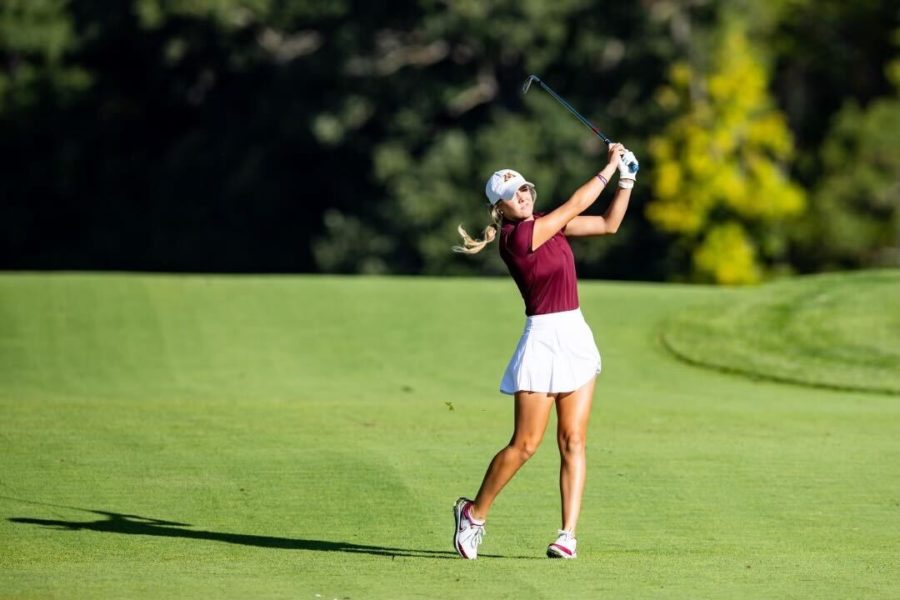When the NCAA announced it would permit student athletes to receive compensation for the use of their name, image and likeness (NIL) on July 1, 2021, fourth-year student athlete Emma Carpenter quickly started looking for opportunities.
Carpenter, who plays on the University of Minnesota’s women’s golf team, said she has obtained several NIL endorsements over the past two academic years, allowing her to earn money and build her public image.
“At first, I really had no idea what I was doing, what kind of money I’d be looking at, what I’d be committed to — I was just completely clueless,” Carpenter said. “When NIL first started, I thought it was just a way to make bonus money while I was still in college, but it became a way to build my brand and parlay an image.”
Carpenter said she started by taking any deal that came her way, but after speaking with an agent, she became selective and waited for longer-term deals that would build her social media and personal brand. She said these deals might not have come her way if she got “too greedy, too quickly” by accepting every opportunity.
Last year, Carpenter said she received an NIL opportunity that combined her passion for golf with her long-term career goals. Gary Williams, who spent a decade as a television host on the Golf Channel, offered her the opportunity to host a recurring segment on his golf podcast, “5 Clubs.”
Carpenter said the value of joining the “5 Clubs” podcast was not just monetary.
“It really gave me a platform to speak out and create a personal brand outside of playing my sport, but it also helped propel my career as well,” Carpenter said. “I want to work in sportscasting, so having an NIL deal where I can start working as a sports journalist was a really cool opportunity.”
Carpenter said she has interviewed several professional and collegiate golfers on the podcast, an experience that would not have been possible without NIL opportunities being allowed.
“It changed my life,” Carpenter said.
NIL opens doors for many advantages, few disadvantages, athletics director says
Vicki Schull is a sport management professor who studies college sports and has worked as an athletic associate director for Suffolk University. She said the NCAA’s “steadfast commitment to amateurism” prevented NIL from becoming legal earlier.
“Even though the landscape had been changing, the NCAA viewed any type of compensation to student athletes as a violation to the principle of amateurism,” Schull said.
According to Schull, growing external pressure from athletes, universities and government figures helped the NCAA finally legalize NIL deals for student athletes in 2021.
Schull said there are several advantages for college and university athletics departments in allowing students to pursue NIL deals, including good PR exposure and student athletes being able to focus more on education when receiving NIL money instead of working another job.
“The biggest thing is if it’s good for the athletes, then it’s good for the athletic departments,” Schull said.
However, Schull said NIL can hurt recruiting efforts because the amount of NIL opportunities can vary by location, making geography a factor in student athletes’ decisions on where to attend college.
It is also possible some student athletes will take “shady” deals because they don’t have experience with NIL contracts, according to Schull.
The University’s Law School launched an NIL clinic in September to help student athletes navigate NIL contracts. Chris Pham, the clinic’s director and a professor at the University’s Law School, said the clinic is open to not only University athletes, but all student athletes in the country.
“Students might not have a good sense of what things in a contract mean,” Pham said. “We really try to break it down for the students in plain English and help them understand what they’re signing up for.”
Women’s hockey player encourages all student athletes to pursue NIL opportunities
Makayla Pahl, a fourth-year student and goaltender on the women’s hockey team, said she signed with Lions Den Sports Management to help her obtain NIL deals. She credits her social media following as the reason she started receiving NIL offers.
“I’m really into social media and that’s kind of how I wanted to make my money,” Pahl said. “Once NIL was approved, that was totally huge.”
Pahl said her favorite NIL opportunity has been giving back to youth hockey players by hosting hockey camps.
She said she believes all student athletes should pursue NIL deals if they have opportunities available.
“NIL is a great way for student athletes to take advantage of their time as a student athlete,” Pahl said. “It can provide benefits that will last long beyond college.”




















